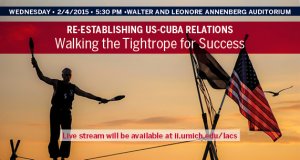Presented By: Center for Latin American and Caribbean Studies
Re-establishing U.S.-Cuba Relations: Walking the Tightrope for Success

Please join us for a panel discussion on the challenges and implications in re-establishing the US-Cuba relations.
Panelist:
Ruth Behar, professor of anthropology and a MacArthur Fellow, can discuss how renewed ties could affect Cuba. She's bilingual English/Spanish. Behar is the editor of the pioneering anthology, Bridges to Cuba, and author of several books, including An Island Called Home: Returning to Jewish Cuba and Traveling Heavy: A Memoir in between Journeys. Behar is also a native of Cuba who immigrated to the U.S. as a 5-year-old after the revolution. She has visited Cuba many times and has written extensively about crossing cultural borders. Behar is bilingual English/Spanish.
Silvia Pedraza, professor of Sociology and American Culture, can discuss the social and economic conditions in Cuba and the possible impact of the renewed ties with the US on Cuban society. Her research focuses on the exodus from Cuba over the half century of the revolution. She is the author of Political Disaffection in Cuba’s Revolution and Exodus (Cambridge University Press, 2007). She is presently working on a book comparing the Cuban and Venezuelan revolutions. She was born and raised in Cuba and immigrated to the US at the age of 12, after the revolution. She has visited Cuba many times, seeking to understand the impact of the revolution on people's lives there and the motivation for the exodus. She has contributed to numerous articles by The New York Times, The Miami Herald and El Nuevo Herald, The Los Angeles Times, The Detroit News, among others
Melvyn Levitsky, professor of international policy and practice at the Ford School of Public Policy, can discuss the diplomatic challenges the U.S. and Cuba will face in their negotiations. Levitsky was the U.S. ambassador to Brazil in 1994-98. His expertise includes politics, economics, diplomacy and drug policy.
* For more details about the presenters, please visit ns.umich.edu
Moderator: Jesse Hoffnung-Garskof, assistant professor of American Culture and History
Live stream will be available at ii.umich.edu/lacs
Co-sponsored by: Michigan News; International Policy Center, Gerald R. Ford School of Public Policy; and Cuban Research Institute, Florida International Unviersity
Panelist:
Ruth Behar, professor of anthropology and a MacArthur Fellow, can discuss how renewed ties could affect Cuba. She's bilingual English/Spanish. Behar is the editor of the pioneering anthology, Bridges to Cuba, and author of several books, including An Island Called Home: Returning to Jewish Cuba and Traveling Heavy: A Memoir in between Journeys. Behar is also a native of Cuba who immigrated to the U.S. as a 5-year-old after the revolution. She has visited Cuba many times and has written extensively about crossing cultural borders. Behar is bilingual English/Spanish.
Silvia Pedraza, professor of Sociology and American Culture, can discuss the social and economic conditions in Cuba and the possible impact of the renewed ties with the US on Cuban society. Her research focuses on the exodus from Cuba over the half century of the revolution. She is the author of Political Disaffection in Cuba’s Revolution and Exodus (Cambridge University Press, 2007). She is presently working on a book comparing the Cuban and Venezuelan revolutions. She was born and raised in Cuba and immigrated to the US at the age of 12, after the revolution. She has visited Cuba many times, seeking to understand the impact of the revolution on people's lives there and the motivation for the exodus. She has contributed to numerous articles by The New York Times, The Miami Herald and El Nuevo Herald, The Los Angeles Times, The Detroit News, among others
Melvyn Levitsky, professor of international policy and practice at the Ford School of Public Policy, can discuss the diplomatic challenges the U.S. and Cuba will face in their negotiations. Levitsky was the U.S. ambassador to Brazil in 1994-98. His expertise includes politics, economics, diplomacy and drug policy.
* For more details about the presenters, please visit ns.umich.edu
Moderator: Jesse Hoffnung-Garskof, assistant professor of American Culture and History
Live stream will be available at ii.umich.edu/lacs
Co-sponsored by: Michigan News; International Policy Center, Gerald R. Ford School of Public Policy; and Cuban Research Institute, Florida International Unviersity